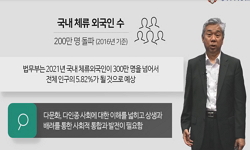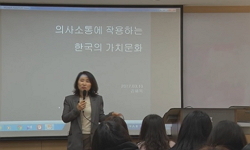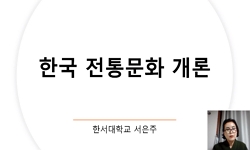본고의 목적은 재미 한인사회 세대 간의 문화 적응의 차이로 인한 갈등의 원인과 선교적 케어를 통한 해결 방안을 찾는데 있다. 이를 위하여 이민자 가족과 교회에 관련한 1세대와 2세대 한...
http://chineseinput.net/에서 pinyin(병음)방식으로 중국어를 변환할 수 있습니다.
변환된 중국어를 복사하여 사용하시면 됩니다.
- 中文 을 입력하시려면 zhongwen을 입력하시고 space를누르시면됩니다.
- 北京 을 입력하시려면 beijing을 입력하시고 space를 누르시면 됩니다.

일반 : 재미 한인 사회 세대 간의 문화적 갈등과 선교적 케어 = Approaching the Intergenerational Cultural Conflict through Missional Care in America
한글로보기https://www.riss.kr/link?id=A100472861
- 저자
- 발행기관
- 학술지명
- 권호사항
-
발행연도
2015
-
작성언어
Korean
-
주제어
세대 간의 갈등 ; 이민교회 ; 한국 문화 ; 미국 문화 ; 선교적 케어 ; 문화 적응 ; Intergenerational conflict ; Immigrant Church ; Korean culture ; American culture ; Missional Care ; Acculturation
-
KDC
231.015
-
등재정보
KCI등재
-
자료형태
학술저널
- 발행기관 URL
-
수록면
154-178(25쪽)
- DOI식별코드
- 제공처
-
0
상세조회 -
0
다운로드
부가정보
국문 초록 (Abstract)
본고의 목적은 재미 한인사회 세대 간의 문화 적응의 차이로 인한 갈등의 원인과 선교적 케어를 통한 해결 방안을 찾는데 있다. 이를 위하여 이민자 가족과 교회에 관련한 1세대와 2세대 한국계 미국인 세대 간의 문화적 갈등과 2세대들의 문화적 갈등에 대한 대응을 살피고, 재미 한인들이 문화적응의 과정에서 문화 적응과 미주 이민자 사회의 중심인 종교 참여를 살펴보았다. 이를 통하여 세대 간의 조화로운 관계로 증진할 수 있는 방법을 발견하였다. 이민 1세대는 미국에서 태어난 자녀들과 문화적 갈등이 크다. 그것은 문화의 적응 속도가 서로 다르고 한국 문화와 미국 문화의 배경을 가지고 있기 때문이다. 세대 간의 갈등을 해결하지 못하면 같은 피부, 같은 가정, 같은 교회이면서도 서로가 이방인으로 살게 된다. 그러므로 이민 사회에 많은 과제가 있겠지만 세대 간의 문화적 갈등을 극복하기 위한 노력은 우선적이고 지속적으로 이루어져야 한다. 1세대와 2세대가 세대 간의 갈등을 넘어 상생하기 위한 선교적 케어방안을 다음과 같이 제안한다. 첫째, 부모가 언어능력과 타문화의 적응을 향상시키기 위하여 적극적인 배움이 필요하다. 둘째, 세대 간의 공유할수 있는 문화를 형성하기 위하여 기독교의 가치관으로 전통적 가치관을 강화시키는 것 보다 이민교회 지도자들이 전통적 가치관을 넘어 성서를 재해석하여 기독교의 가르침과 일치하는 가치관을 두 세대에게 가르쳐 세대 간의 간격을 줄이는 노력이 필요하다. 셋째, 교회는 1세대와 2세대가 세대 간의 간격을 줄이는 목회 구조와 프로그램을 개발하고 실행이 중요하다. 마지막으로 이민 2세대들이 가진 문화적 적응과 언어, 네트워크의 장점을 활용할수 있는 영역을 제공함으로써 나눔의 문화를 만들어 가야 한다.
다국어 초록 (Multilingual Abstract)
The objective of this article is to discuss the inter-generational cultural conf lict in the American family and church context. I will examine how the second-generation are reacting to the cultural conflict and make propositions for how the two gener...
The objective of this article is to discuss the inter-generational cultural conf lict in the American family and church context. I will examine how the second-generation are reacting to the cultural conflict and make propositions for how the two generations can peacefully interact. The inter-generational cultural conf lict at home arises from the contradiction of Korean culture, which revolves around collectivism and Confucianism, and the individualistic culture of America. Other reasons can include communication barriers between parent and child as most Korean parents lack English proficiency, and the parents’ emphasis on education which can become a major cause for stress and pressure for children. At church, the inter-generational conflict appears from the first generation’s traditional values that may be contrary to the Bible teachings given to children. Without communicative channels to clearly voice their concerns, the second generation clash with the first. The second generation’s response to the inter-generational cultural conflict mainly lies in the action of leaving the immigrant church and joining another church with less intergenerational conflicts. As a result, the Korean ethnic churches divide into two separate bodies according to the language they speak. Also, the second-generation tends to turn to evangelical Christian movements that engage with the world and move beyond ethnic borders. This can be seen as a move to de-emphasize cultural or racial differences and place importance on the shared Christian identity. For the two generations to have positive interactions, it is crucial that community-based organizations are set up for children to learn their parent’s culture and language. However, because cultural conflicts are still prone to occur, I propose the steps in missional care: educate parents to develop effective parenting skills and strengthen communication skills, reinterpret traditional values through Christian teaching to reach a middle ground between parent and child, and finally, allow second generation to participate in the church to create a shared culture between the two generations.
1 윤인진, "코리안 디아스포라" 고려대학교출판부, 2005
2 Baker, Colin, "이중 언어 교육 길라잡이" 넥서스, 2006
3 오상철, "이민신학" 쿰란출판사, 2008
4 박경숙, "세대 갈등의 소용돌이" 다산출판사, 2013
5 "미 전국 4,323개 집계" 미주 한국일보 (2014. 1. 19), 2014
6 Lingenfelter, Sherwood, "문화적 갈등과 사역: 인간관계와 성 육신" 예수전도단, 2005
7 현용수, "문화와 종교교육" 쉐마, 2011
8 권상길, "디아스포라 2세 교육목회" 예영커뮤니케이션, 2009
9 최현미, "다문화 가족복지론" 양서원, 2008
10 McGavran, Donald, "기독교와 문화의 충돌" CLC, 2007
1 윤인진, "코리안 디아스포라" 고려대학교출판부, 2005
2 Baker, Colin, "이중 언어 교육 길라잡이" 넥서스, 2006
3 오상철, "이민신학" 쿰란출판사, 2008
4 박경숙, "세대 갈등의 소용돌이" 다산출판사, 2013
5 "미 전국 4,323개 집계" 미주 한국일보 (2014. 1. 19), 2014
6 Lingenfelter, Sherwood, "문화적 갈등과 사역: 인간관계와 성 육신" 예수전도단, 2005
7 현용수, "문화와 종교교육" 쉐마, 2011
8 권상길, "디아스포라 2세 교육목회" 예영커뮤니케이션, 2009
9 최현미, "다문화 가족복지론" 양서원, 2008
10 McGavran, Donald, "기독교와 문화의 충돌" CLC, 2007
11 Alba, R. Nee, "V. Remaking the American mainstream: Assimilation and contemporary Immigration" Harvard University Press, 2003
12 Alba, R., "The kids are alright: Second-generationAssimilation: Comments on Haller, Prtes, and Lynch" Social Forces 89 (3) : 763 ~ 774, 2011
13 Kim, S. S., "The experiences of young Korean immigrants: A grounded theory of negotiational social, cultural, and generational boundaries" Issues in Mental Health Nursing 25 : 517 ~ 537, 2004
14 Yeh, C. J., "The cultural negotiations of Korean immigrant youth" Journal of Counseling and Development 83 : 172 ~ 182, 2005
15 Kim, E., "The Korean American family: Adolescent versus parents acculturation to American culture" Journal of Cultural Diversity 15 (3) : 108 ~ 116, 2008
16 Ying, Y., "Strengthening intergenerational/intercultural ties in migrant families: A new intervention for parents" Journal of Community Psychology 27 (1) : 89 ~ 96, 1999
17 Stevens, W. D., "Spreading the word: Religious beliefs and the evolution of immigrant congregations" Sociology of Religion 65 (2) : 121 ~ 138, 2004
18 Kim, S., "Shifting boundaries within second-generation Korean American churches" Sociology of Religion 71 (1) : 98 ~ 122, 2010
19 Hurh, W. M., "Religious participation of Korean immigrants in the United States" Journal for the Scientific Study of Religion 29 (1) : 19 ~ 34, 1990
20 Portes, A., "Legacies: The story of the immigrant second generation" Russell Sage Foundation, 2001
21 Min, P. G., "Intergenerational transmission of religion and culture: Korean Christians in the U.S." Sociology of Religion 66 (3) : 263 ~ 282, 2005
22 Wu, C., "Intergenerational cultural dissonance in parent-adolescent relationships among Chinese and European Americans" Developmental Psychology 47 (2) : 493 ~ 508, 2011
23 Kasinitz, P, "Inheriting the City: The children of immigrants come of age" Russell Sage Foundation, 2008
24 Alba, R.,Pierce, l.,Suh, S., "Immigration and religion in America: Comparative and historical perspectives" New York University Press, 2009
25 Eum-Kim, Y. S., "Guidelines and Strategies for Cross-Cultural Counseling with Korean American Clients" Journal of Multicultural Counseling and Development 33 : 217 ~ 231, 2005
26 Chung-Gim, R. H., "Gender, ethnicity, and acculturation in intergenerational conflict of Asian American college students" Cultural Diversity and Ethnic Minority Psychology 7 (4) : 376 ~ 386, 2001
27 Kim, B. C.,McGoldrick, M., "Ethnicity family therapy" Guilford Press, 1996
28 Kim, I. Kim, "Developing cultural competence in working with Korean immigrant families" Journal of Community Psychology 34 (2) : 149 ~ 165, 2006
29 Cho, S., "Demography, psychosocial factors, and emotional problems of Korean American adolescents" Adolescene 40 (159) : 545 ~ 549, 2005
30 Ahn, A., "Asian cultural values gap, cognitive flexibility, coping strategies, and parent-child conflicts among Korean Americans" Cultural Diversity and Ethnic Minority Psychology 14 (4) : 353 ~ 363, 2008
31 Uba, L., "Asian Americans" Guilford Press, 1994
32 벨커 미하일, "21세기 초의 개혁주의 문화신학의 개념" 한국개혁신학 9 : 29 ~ 43, 2001
33 김상훈, "21C 시대적 특징과 성경해석학적 노력: 배타성과 포함성의 선택" 한국개혁신학 9 : 89 ~ 106, 2001
동일학술지(권/호) 다른 논문
-
분단 고통의 기독교 윤리적 의미와 극복 방안으로서의 남북통일 모색
- 한국개혁신학회
- 이장형 ( Jang Hyung Lee )
- 2015
- KCI등재
-
일반 : 느부갓네살의 금신상과 니므롯의 바벨탑: 다니엘서 제3장의 창세기 바벨 기사 인유(引喩)
- 한국개혁신학회
- 김대웅 ( Dae Woong Kim )
- 2015
- KCI등재
-
지지울라스의 관계적 삼위일체론에 대한 이해: “친교로서의 삼위일체 하나님”과 그 신학적 함의
- 한국개혁신학회
- 김은수 ( Eun Soo Kim )
- 2015
- KCI등재
-
기독교 전통에 나타난 몸신학과 현대적 몸의 재해석: 몸 주체와 지금 여기에서의 몸
- 한국개혁신학회
- 김광연
- 2015
- KCI등재





 KCI
KCI KISS
KISS







